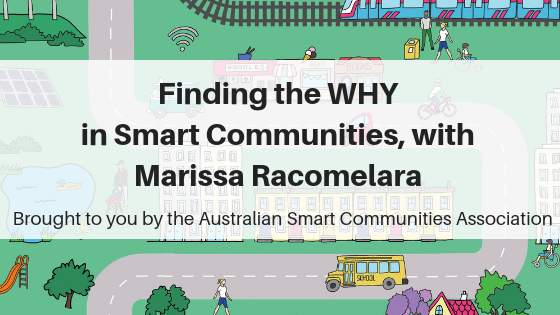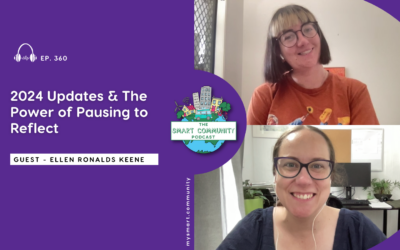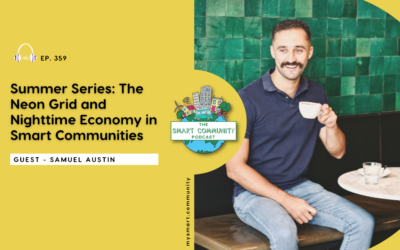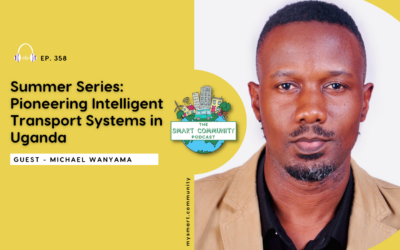In this episode of the Smart Community Podcast, I had a really interesting chat with Marissa Racomelara, the Director for Transformation and Change at Georges River Council, and Board Secretary of the Australian Smart Communities Association. We talk about how Marissa’s background in criminology and designing spaces to prevent crime really sparked her interest in Smart Cities and Communities, and why she believes they’re so important. Marissa shares with us how she sees Australia embracing Smart concepts, as well as the necessary balance between professionals guiding Smart processes and intentional community engagement or feedback. Marissa then tells us about the Smart City projects she’s working on at George’s River Council and the work we’re doing at ASCA. We finish our conversation discussing the emerging trends of having a common purpose when collaborating, and focusing on the ‘why’ and real problem solving in Smart Communities rather than only thinking about the new shiny tech. This episode is brought to you by the Australian Smart Communities Association. As always I hope you enjoy listening to this episode as much as I enjoyed making it.
Listen Here:
What we cover in this episode:
- Marissa’s background in criminology and how that shaped her passion for designing spaces
- How emerging technologies being used in built and natural environment design sparked Marissa’s interest in Smart Cities and Communities
- What a Smart City and Community is and why Marissa believes it’s so important
- The necessary balance between professionals guiding the Smart processes, and intentional community engagement and feedback
- How Marissa sees Australia embracing the Smart concepts
- The need to give tools to local government so they can better engage with and gather the knowledge of Smart citizens
- The projects Marissa is working on at George’s River Council in making public space more productive
- About the work that ASCA does in supporting organisations and local governments to build Smart Communities
- The importance of assessing the impacts of technology and facilitating trust with diverse groups of community decision makers and stakeholders
- Bridging the gap between what can actually be achieved and the communities’ expectations
- Why we need a common purpose when it comes to integrating across disciplines, industries, government and academia
- The emerging trends of focusing on the ‘why’ and real problem solving in Smart Communities rather than only thinking about the new shiny tech
- The power of breaking down silos and bringing people on the Smart Community journey
Quotes:
“My core passion is really about using multiple tools to help organisations better reach their goals, specifically in the design of spaces.”
“The way a space works can really benefit so many aspects of somebody’s life, the interaction of the built and natural environments being vital to the health of an individual and the community. By using emerging technologies we can help to build those places in the best way possible.”
“I don’t think most people want a Smart City per se, they want a great community with or without technology…I believe the Smart City concept is important as a methodology rather than an outcome.”
“I think it comes down to how we definite the world Smart. I think we can do Smart policy and Smart decision making, and it doesn’t have to be about the technology, although often the technology can give us additional information to consider.”
“I think local government’s work is probably one of the most important aspects of [Smart Cities]. Whilst there might be legislative and policy decision at other levels of government and certainly they have a role to play in funding allocation, local government is the group on the ground actually making a real difference, really testing different technologies, different ways of working and seeing what the outcomes are for real people in the real world.
“The way [local government] engage our communities and opening
up their sphere of knowledge to include things that may not even exist yet is important, but we’re the people on the ground who understand how [the community lives] and therefore we’re best placed to make those transitions easier and smoother and increase their liveability.”
“I think one of the things we get hung up on in Smart Cities is the data, using the data and data-driven decision making. But I truly believe that data is just one lens through we we can look at things, and we really need to combine multiple lenses to really understand the story of what’s happening and why it’s happening…to see things through all those different lenses you need things to experience that in different ways sitting around the table.”
“I think [the emerging trend is] that we’re beginning to see a real shift towards examining the WHY. Why do we want this shiny new technology? Why is this data being collected? Why are people making these decisions that result in a certain outcome?”
Connect:
Connect with Marissa on the ASCA website or via LinkedIn
Connect with me via email: hello@mysmart.community
Connect with My Smart Community via LinkedIn or Twitter and watch on YouTube
Podcast Production by Perk Digital






0 Comments